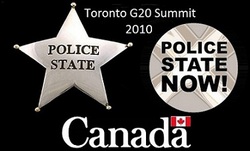When CSIS rings your doorbell
With the G20 Summit approaching, political activists accuse the federal spy agency of trying to undermine democracy and freedom of speech. So far, 28 have been interviewed by agents
By CATHERINE SOLYOM
Each visit would begin in more or less the same way, usually early in the morning or late at night, as a CSIS agent would ring the doorbell and flash his credentials.
Then the questions would begin:
How long have you known Stefan Christoff ?
Is Stefan Christoff an anarchist?
Is he planning to protest at the G8 summit?

But it’s only when Canadian Security Intelligence Service agents continued to drop in on Christoff’s friends and acquaintances, after the Vancouver Olympics and now into summit season, that the local activist became alarmed.
“The first couple of visits were disconcerting, but now it has become a pattern,” said Christoff, 29, a vocal opponent of the Harper government and an advocate for human rights.
Christoff was first told he was the subject of CSIS questions late last fall after he joined with aboriginal groups to protest against the Vancouver Olympics as the torch passed through Montreal.
Seven people have since been questioned about him, from musicians he has worked with to refugee claimants he has sought to defend.
“When the government is spying on citizens involved in public, democratic activities everyone should be concerned,” he said. “Not just me and the people I know. Everybody … It’s intimidation and it creates a culture of fear.”
Christoff, who has helped organize pro-Palestinian demonstrations and benefit concerts for Haiti, is not the only activist to be put under surveillance recently.
In Toronto, as construction workers continue to erect a three-metre-high fence around the area where the G20 summit will be held June 26-27, community groups say CSIS and Toronto Police have been questioning people planning to protest outside the fence.
As of yesterday, 28 organizers had been questioned, eight of them by CSIS agents.
And in Montreal, Freda Guttman, a visual artist and human rights activist, also received an unexpected visit recently.
CSIS rang her doorbell April 7. But she refused to speak to them.
“I can’t prove it, but I’m assuming I was visited because of my work on behalf of Palestinian rights,” said Guttman, 76. “My reaction was to feel terribly angry, first that I was visited just because I happen to disagree with my government’s position on Israel … And as a Canadian I have protection. But I really worry about all the people in more precarious positions like immigrants and refugees. When you don’t know your rights, it’s very intimidating and threatening to be visited by CSIS, and that’s why CSIS is doing it.”
A spokesperson for the intelligence service confirmed yesterday that CSIS has been conducting “private interviews” relating to certain activists -and will continue to do so, though the intention isn’t to intimidate people, but to gather information.
“We collect and analyze information and intelligence on all threats to national security,” Isabelle Scott said. "One of the ways we do that is by meeting with individuals who may have information of interest. While most cooperate, some individuals simply don’t want to speak with us and choose to characterize our visits as a violation of their rights.
“It’s our job to collect information on potential threats -these interviews are necessary, they are legal and responsible, and they will continue.”
Clayton Ruby, a prominent civil rights lawyer in Toronto, agreed yesterday that CSIS does indeed have the right, according to its mandate, to interview whomever it chooses, but that interviewees also have the right to refuse to speak to CSIS.
However, this kind of questioning, called a “noisy” investigation, is not designed to get information, Ruby said, but to “stir the pot” -to let the subject know he is under investigation and hope that he calls someone or does something incriminating while CSIS is listening.
“It’s an old technique, and sometimes it works,” Ruby said. “The problem is that it has a chilling effect on freedom of expression and freedom of assembly which our constitution guarantees. It’s a dangerous phenomenon in a free society.”
Still, none of this explains why CSIS would target someone like Christoff who is so public about his views and activities, said his friend Ian Ferrier, a writer and performer who was visited by CSIS recently and asked, among other things, whether Christoff was a violent person.
“He is the opposite of violent,” Ferrier said yesterday. He wishes he had never answered CSIS’s questions to begin with, and now wonders what the agency will do with the information.
If the point was indeed to create a chilling effect on would-be protesters, the investigation of Christoff might have done the opposite.
“The CSIS agent who came to my door said, at the end of our conversation, that he hoped I would keep our conversation confidential,” Ferrier said. “I feel that I should do exactly the opposite: tell everyone what happened, and make what happened a matter of public record.”
As for Christoff, who was never contacted by CSIS directly, he plans to protest the G20 protests in Toronto, “along with tens of thousands of other people.”
Source: http://www.montrealgazette.com/news/When+CSIS+rings+your+doorbell/3139439/story.html



